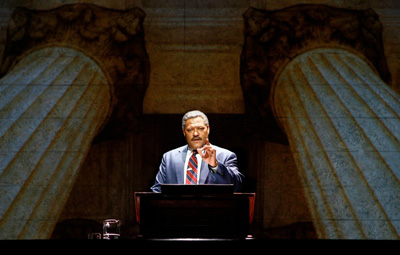
By Cynthia Citron

LOS ANGELES–At the same moment that Supreme Court nominee Elena Kagan was being chided by the Republicans on the Senate Judiciary Committee for having clerked for the suddenly demonic “activist judge,” Thurgood Marshall, Marshall himself, in the person of actor Laurence Fishburne, was enthralling audiences in a dynamic nearly two-hour monologue at the Geffen Playhouse in the Westwood neighborhood of Los Angeles Interesting timing!
Fishburne, in his bravura performance, takes us through the life of this iconic lawyer and judge, from his terrifying experiences with Jim Crow racism, through his most pivotal legal cases in the fight for civil rights, to his history-making service on the U.S. Supreme Court.
Folksy and charming, Fishburne begins with a litany of the “distinctive names” in his family, such as Isaiah Olivebranch Williams and someone named “Fearless.” Marshall himself was named Thoroughgood, but by the time he got to second grade he had decided it was too long to spell, and so he changed it to Thurgood.
Marshall was born in Baltimore, which at that time was called “up South” because it was where slaves from the Deep South went when they ran away from their owners. Marshall’s great grandfather was one of those slaves.
His father was a railroad porter and for a time Marshall worked as a dining car waiter, but his ambition was always focused on the law, with special emphasis on the Constitution. (As a child, he had been “punished” for misbehavior by having to memorize a portion of that document, and by the time he finished high school he could recite it all by heart.)
At Lincoln College, an “all Negro college with all white professors,” he was pinned to seven coeds at the same time. But he also spent time with his friend and classmate Langston Hughes, the poet and writer who made his mark during the Harlem Renaissance of the 1920s. It was Hughes who inspired in Marshall the belief that “one person can make a difference.”
Having graduated from Lincoln, Marshall applied to the University of Maryland’s Law School, but was turned down because of his race. So he went to Howard University, which was known as “the dummies’ retreat” and graduated at the top of his class. (Many years later, as a famous practicing lawyer, Marshall had the satisfaction of winning the case that forced the University of Maryland to accept Negro students.) But it was at Howard that he met the man who would be his lifelong friend and mentor, Professor Charlie Houston. It was Houston who taught him that “the law is a weapon,” and that he could use it to obtain justice. “A man who is not a social engineer,” Houston said, “is a social parasite.”
And so Marshall used his love affair with the 14th Amendment to win some of his most outstanding cases. It is the 14th Amendment that broadens the definition of “citizenship” to include blacks and introduces both the Due Process Clause, which requires substantive due process before an individual or corporation can be deprived of life, liberty or property, and the Equal Protection Clause, which provides for equal protection for all citizens under the law. It was by citing this amendment that Marshall won first, equal pay for his mother, a Negro school teacher, and later, the famous Brown v Board of Education case by which the U.S. Supreme Court mandated the end of racial segregation in the schools.
As Chief Counsel for the National Association for the Advancement of Colored People (NAACP), Marshall traveled some 100,000 miles a year to change the laws that prevented Negroes from voting. “Without the ballot a man is not a citizen,” he insisted. And as a civil rights activist he won his first case before the Supreme Court at the age of 32.
Appointed Solicitor General by President Lyndon Baines Johnson in 1965, he served only two years before LBJ tapped him to be the first African-American to sit as an Associate Justice on the U.S. Supreme Court. He held that post for 24 years.
All this history is presented with much emotion and humor by Fishburne, and even though the setting by Allen Moyer is relatively static, the story is consistently engrossing. Director Leonard Foglia keeps Fishburne bouncing around, modulating his enthusiasms and disappointments and rendering Marshall’s actual arguments simply and effectively.
But the prize goes to playwright George Stevens, Jr., who authored this demanding stage piece. Stevens won an Emmy for the miniseries ‘Separate but Equal,’ which told the Brown v Board of Education story, and is the founder of the American Film Institute, and creator and producer of the Kennedy Center Honors. He has won 12 Emmys, eight awards from the Writers Guild of America, two Peabody awards, and was named by President Obama as co-chair of the President’s Committee on the Arts and Humanities.
Thurgood is a must-see for history buffs. It will continue at the Geffen Playhouse, 10886 Le Conte Avenue, in Westwood, Tuesdays through Fridays at 8 p.m., Saturdays at 3 and 8 p.m., and Sundays at 2 and 7 p.m. through August 8th. Call the boxoffice at (310) 208-5454 daily between noon and 6 p.m. to order tickets.
*
Citron is Los Angeles bureau chief for San Diego Jewish World